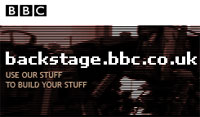 The BBC has let rip with a new beta service that invites Web developers and designers outside of the organisation to start fiddling about with their content and “create cool new things”.
The BBC has let rip with a new beta service that invites Web developers and designers outside of the organisation to start fiddling about with their content and “create cool new things”.
Launching in the summer, the BBC Backstage site gives code monkeys, app writers and graphics types the opportunity to bend and twist BBC digital content into new shapes.
The project lets developers get their greasy mitts on a collection of feeds and other tools for “re-mixing” and re-purposing the BBC’s offerings in different ways.
“We want to promote innovation and creativity on the net by opening access to some of BBC’s content and services,” enthused co-project leader Ben Metcalfe.
“Essentially, backstage.bbc.co.uk is enabling developers to create new contexts and user experiences around BBC content, like creating alternative ways to navigate, or remixing it with content and services from other providers like Yahoo,” he continued.
 The UK broadcasting goliath made a commitment to support social innovation in response to last year’s Graf Report, and this is echoed in their plans to develop an open community where people can share expertise, ideas, and collaborative efforts.
The UK broadcasting goliath made a commitment to support social innovation in response to last year’s Graf Report, and this is echoed in their plans to develop an open community where people can share expertise, ideas, and collaborative efforts.
Contributors can join an email discussion and chat away with technical and design staff from the BBC’s new media departments.
The BBC is hoping that by letting creatives fiddle about with their innards, fun, innovative and just plain bonkers new ways of presenting content may emerge, with the possible spin-off of stimulating a UK market for creative venture capital.
By opening up its content feeds and its “API” – application program interface – the BBC hopes that anyone with the right skills can use the digital content to create new search tools, or groovy ways of displaying that content.
An API is essentially a set of computer protocols and tools for building software applications, and the BBC intends to release new APIs gradually, as negotiations with other parts of the BBC take place.
The project is open to just about anyone, and if some bright spark comes up with a particularly cunning idea, the BBC might take it further in collaboration with the developer.
 It’s not all about profit though, with the BBC hoping that contributors will create prototypes on their Web sites to be freely shared with others for non-commercial use.
It’s not all about profit though, with the BBC hoping that contributors will create prototypes on their Web sites to be freely shared with others for non-commercial use.
Users won’t be tied to the BBC either, so if a proposal looks interesting to a third party company, they are free to take them further too.
This approach makes particular sense for applications designed for a specific device – such as a PDA – on which the BBC couldn’t justify dishing out their precious licence fee money.
The beta launch this week is designed to get developers to come up with suggestions about the kind of material they’d like to fiddle about with.
Although it is a significant move for a major content provider like the BBC to publicly offer their APIs, Web big boys like Google and Yahoo have already taken the step of making their APIs available for programmers to create applications.
Opening up material to communities of developers can drive real innovation, although it should be noted that it’s not a free for all, with rules in place detailing what is permitted under the agreement.
“We want to identify online talent and exciting propositions that use that talent and showcase that to the world. We want people to have fun with our content as well,” explained Mr Metcalfe.